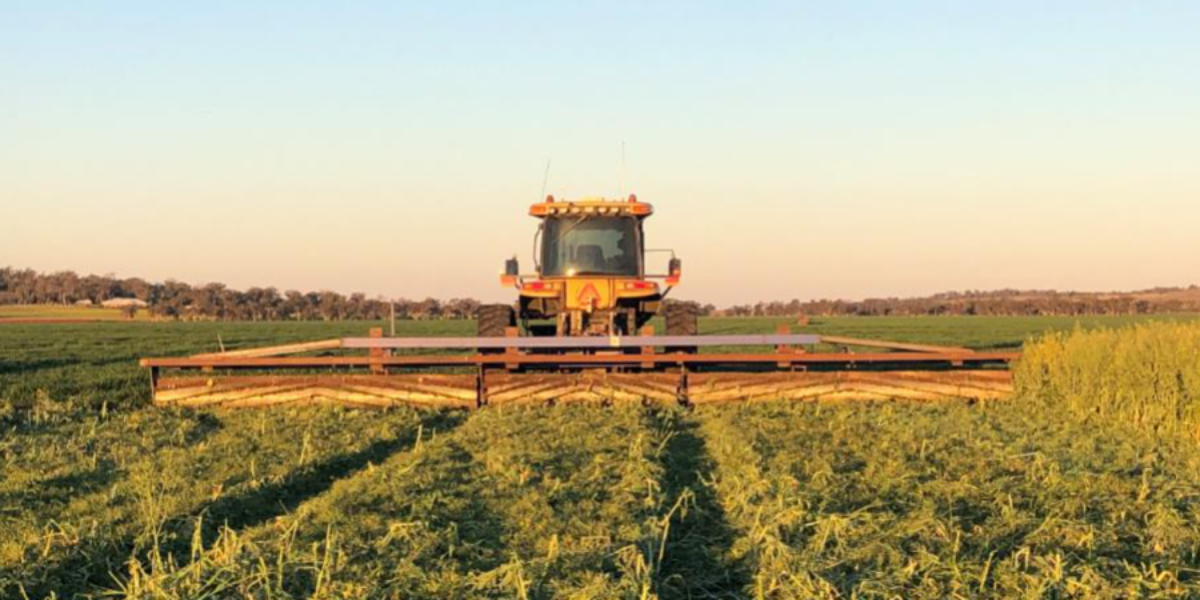A field day in Emerald Hill next week will be demonstrating the possibilities of improving soil through the use of cover crops and a new-ish practice called roller crimping.
Soils for Life are hosting a ‘Making Cover Crops Work’ field day on Wednesday 27 March in Emerald Hill, near Gunnedah. Local farmers and others can hear from grain and cotton farmer Scott McCalman about how he is integrating cover crops in his broadacre enterprise, and his experiences with roller crimping, and his journey in easing off intensive inputs and how he is building resilience in his soils and business.
Courtney Young from Soils for Life says the field day will be looking at all the ins and outs of the practice of cover cropping.
“So looking at plant nutrition, termination, roller crimping, in particular, and soil monitoring.
“All the literal the ducks that you need to have in a row in order to get value out of your cover crops.”
Local cotton and sorghum farmer Scott McCalman, will be welcoming people to his property ‘Karunda’ as part of the field day.
“Scott has been experimenting with cover crops for a number of years now, and has made some really big gains in terms of his soil health and farm resiliance,” Courtney said.
“So we’re really looking forward to learning from his experience.”
Courtney says that cover cropping can serve a number of purposes, but Scott has been using it to assist with nutrient cycling.
“I you’ve got plants in the soil year round, you’re feeding the soil biology and you’re cycling those nutrients, keeping your soils ticking along for the next cash crop.
“Specific cover crops can also replenish some nutrients, and they can provide ground cover, making sure that you’ve got ground cover so you’re not losing moisture.”
Scott has apparently also made his own roller crimper. Roller crimping is a practice to improve soil health in a sustainable way. Water-filled drums with Chevron-patterned blades are attach to the front or back linkage of a tractor. The device knocks down cover
crops, crimping the stems in several places, stopping the sap flow and forming a mulch matt to suffocate weeds. The crimped crop can then be planted directly into with the following cash crop. Courtney said the practice has been developing overseas for a while, but is relatively new to Australia.
“Roller crimping is just an alternative way of terminating the cover crop.”
“You’re literally just rolling it onto the ground and breaking it at the stem with this big massive roller with the chevron pattern in it, getting that biomass onto the ground to begin breaking down and providing that ground cover,”
Plant and soil health educator Joel Williams will also be on hand share his insights into plant nutrition, how to optimise plant immunity and soil function, and how to reduce inputs while also managing risk. Joel is an Australian plant and soil health educator who is currently based in Canada.
“Joel is quite renowned in this space,” Courtney said.
“He’ll be joining us to kind of talk more on the plant nutrition side of things and really dig deep into that into the science of it all.
“Also the practicalities of those incremental first steps that farmers can take to start moving their systems into regenerative into a more regenerative system.”
This event will start at the Emerald Hill Community Hall and finish at Scott McCalman’s property ‘Kuranda’. Morning tea and lunch will be provided. Book your tickets here https://events.humanitix.com/making-cover-crops-work.
If you’re unable to make the event, keep an eye on the Soils for Life website for future events and online resources.
Something going on in your part of the region you think people should know about? Send us a news tip or email newsdesk@netimes.com.au.

